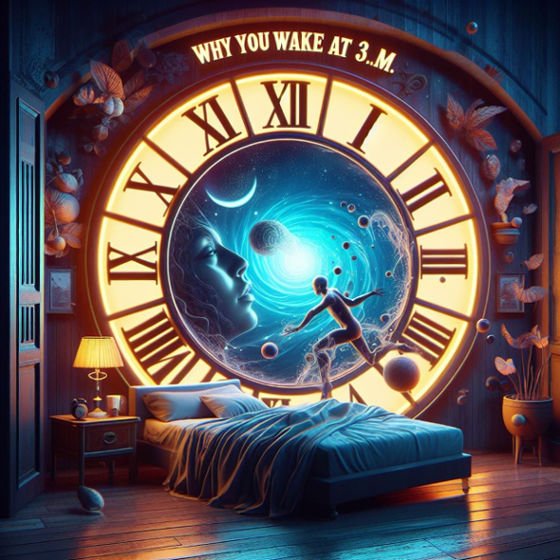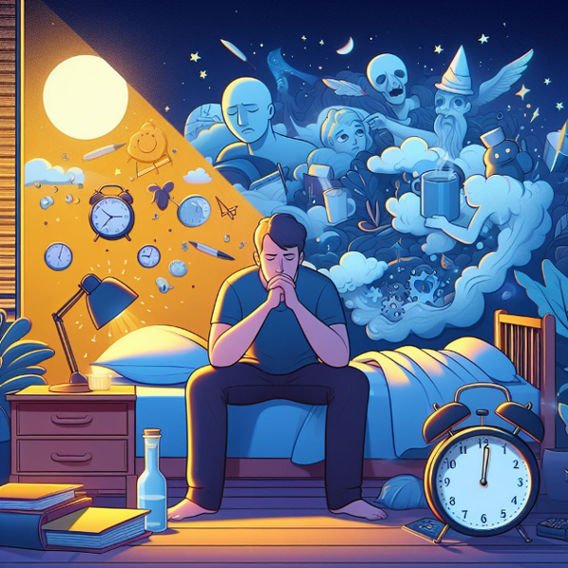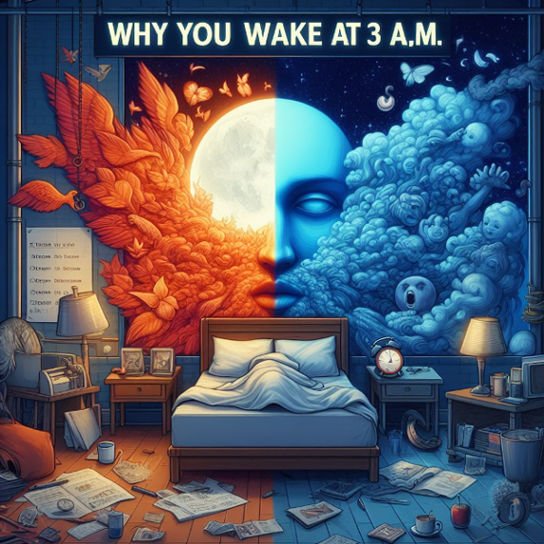
Hydrate smartly: Avoid overdoing fluids before bed, but don’t deprive yourself entirely.
Ditch the late-night feast: Heavy meals before bedtime can lead to discomfort and extra bathroom trips.
Chill out: Stress and anxiety can mess with sleep, making bathroom visits more likely. Address emotional well-being through relaxation techniques.
Rule out sleep disorders: Sleep apnea or nocturia could be culprits. Consult a doctor if needed.
Dim the lights and quiet the noise: Create a peaceful sleep environment to minimize disruptions.
Seek help if needed: Don’t suffer in silence. Consult a doctor to explore hidden causes and personalized solutions.
Battling the 3 a.m. Blues: Why You Wake Up and How to Get Back to Sleep
The clock strikes 3:00 a.m., not with a gentle chime but with a blaring alarm in your head. You’re wide awake, staring into the darkness, and wondering why this keeps happening. Don’t worry, you’re not alone. Countless others join the “3 a.m. Club” each night, battling the frustration of disrupted sleep. But fear not, weary traveler! This article delves into the potential culprits behind your midnight wake-up calls and equips you with strategies to combat them, so you can finally say goodbye to the 3 a.m. blues.
A Peek into the Sleep World: Understanding Your Cycles
Before we tackle the culprits, let’s understand the terrain. As we slumber, we cycle through light sleep, deep sleep, and REM (rapid eye movement) sleep. Around 3 a.m., we experience a natural shift from deep to lighter REM sleep. This transition sometimes involves a brief awakening, which is normal. However, external factors or underlying issues can turn this fleeting moment into a prolonged struggle.
The Mystery Unveiled: Common Culprits of Your 3 a.m. Wake-up
Now, let’s meet the usual suspects who might be sabotaging your sleep:
| Lifestyle Choices |
- The Caffeine Culprit: We all love our coffee and tea, but their stimulating effects can last hours. Try limiting caffeine intake, especially later in the day.
- The Alcohol Ambush: While it might induce drowsiness initially, alcohol disrupts sleep cycles later, leading to fragmented sleep and early awakenings. Opt for calming alternatives before bed.
- The Late-Night Feast: That midnight snack might seem tempting, but heavy or spicy foods close to bedtime can trigger indigestion and discomfort, keeping you awake. Stick to light, healthy snacks if you must.
- The Blue Light Bandit: Our electronic devices emit blue light, which suppresses melatonin, the sleep-regulating hormone. Avoid screens for at least an hour before bed, and use blue light filters if necessary.
- The Inconsistent Clock: Going to bed and waking up irregularly confuses your body’s internal clock. Stick to a consistent sleep schedule, even on weekends, for better sleep quality.
- The Stress Monster: Feeling stressed or anxious can make it difficult to fall asleep and stay asleep. Practice relaxation techniques like meditation or deep breathing before bed to calm your mind.
| Environmental Factors |
- The Temperature Thief: Feeling too hot or too cold can disrupt sleep. Aim for a cool, comfortable room temperature (around 65°F) for optimal sleep.
- The Noise Intruder: Traffic, snoring partners, or even a barking dog can disrupt your sleep. Use earplugs, white noise machines, or soundproof curtains to create a quieter environment.
- The Light Invader: Even streetlights can disrupt sleep. Invest in blackout curtains or an eye mask to block out unwanted light.
| Medical Conditions |
- The Sleep Disorder Culprit: Conditions like sleep apnea or insomnia can significantly impact sleep quality and cause frequent awakenings. Consult a doctor if you suspect a sleep disorder.
- The Medical Mystery: Certain health conditions, like acid reflux or thyroid problems, can also cause sleep disturbances. Seek medical attention if you suspect an underlying medical issue.
Reclaiming Your Sleep Sanctuary: Strategies for a Restful Night
Now that you know the potential culprits, here are some effective strategies to turn your bedroom into a sleep haven:
| Embrace Sleep Hygiene: Develop a relaxing bedtime routine that includes winding down activities like reading or taking a warm bath. Create a sleep-conducive environment with comfortable bedding, darkness, and cool temperature. Move Your Body: Regular exercise improves sleep quality, but avoid strenuous activity close to bedtime. Manage Stress: Practice relaxation techniques like meditation, yoga, or deep breathing to manage stress and anxiety before bed. Fuel Your Body Right: Avoid heavy meals close to bedtime, but don’t go to bed hungry. Opt for light, healthy snacks if needed. Seek Professional Help: If your 3 a.m. awakenings persist and significantly impact your daily life, consult a doctor or sleep specialist for diagnosis and personalized treatment. |
Remember: You’re not alone in this battle against the 3 a.m. blues. By understanding the reasons behind your wake-ups and implementing these strategies, you can finally achieve the restful sleep you deserve. Sweet dreams!
Additional Tips:
- Identify your triggers: Track your sleep patterns and note what you did before your 3 a.m. awakenings.
How do I stop waking up at 3 am?
At three a.m., our liver is detoxifying. So, if a woman is constantly waking up at this stage of her sleep, it means her liver is struggling to detoxify or offload for the night.
Why did I wake up at 3 am for no reason?

Waking up at 3 a.m. can be inconvenient, but it does not always indicate a larger problem. Occasionally, you may wake up in the middle of the night due to temporary stress. More frequent 3 a.m. wake-ups that keep you awake for an extended period may indicate insomnia or another health condition.
What does 3 am mean spiritually?
Waking up at 3 a.m. is not recommended because it is also known as the Devil’s Hour. It is believed that unusual events occur at this time, including the free passage of two dimensions. This is thought to be the time when the distinction between the living and the dead thins.
Do you often wake up between 3 and 5 a.m. when a higher power is trying to tell you something?
But if you wake up between 3 and 5 a.m., you should take it as a sign that a higher power is trying to communicate with you. When you wake up at this time of night, you should pay closer attention because you may be receiving an important message from the supernatural world.
Is 3 a.m. a good time to sleep?
However, many people sleep late into the night, around 2 or 3 a.m. They get their 8 hours of uninterrupted sleep, but they won’t benefit from all of it. This is because they are not sleeping at the proper times.
How do I cure my sleep anxiety?
Reading, listening to music, or relaxing before bed with a hot bath or deep breathing can all aid in falling asleep. If you don’t fall asleep within 20 minutes of going to bed (or if you wake up and can’t go back asleep), get out of bed and do something soothing until you’re drowsy.

I’m a seasoned content creator with 6+ years of experience crafting engaging, SEO-optimized content that drives traffic and rankings. I excel in keyword research, link building, and guest posting, ensuring your brand reaches new heights.

